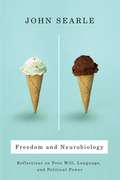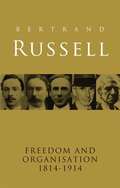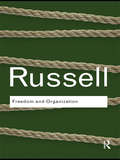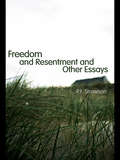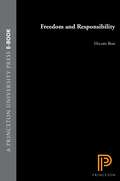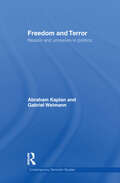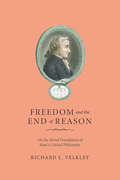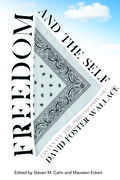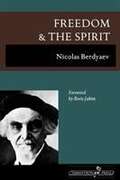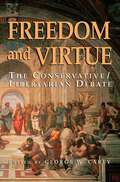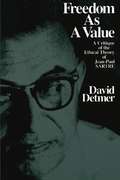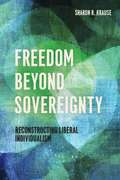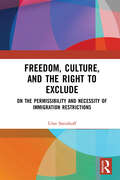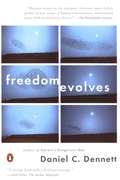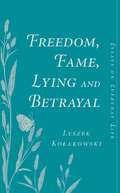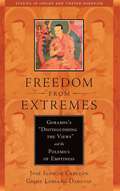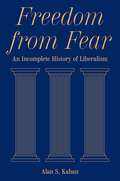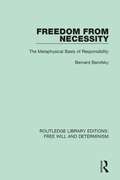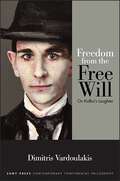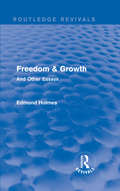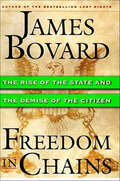- Table View
- List View
Freedom and Neurobiology: Reflections on Free Will, Language, and Political Power (Columbia Themes in Philosophy)
by John SearleOur self-conception derives mostly from our own experience. We believe ourselves to be conscious, rational, social, ethical, language-using, political agents who possess free will. Yet we know we exist in a universe that consists of mindless, meaningless, unfree, nonrational, brute physical particles. How can we resolve the conflict between these two visions?In Freedom and Neurobiology, the philosopher John Searle discusses the possibility of free will within the context of contemporary neurobiology. He begins by explaining the relationship between human reality and the more fundamental reality as described by physics and chemistry. Then he proposes a neurobiological resolution to the problem by demonstrating how various conceptions of free will have different consequences for the neurobiology of consciousness. In the second half of the book, Searle applies his theory of social reality to the problem of political power, explaining the role of language in the formation of our political reality. The institutional structures that organize, empower, and regulate our lives-money, property, marriage, government-consist in the assignment and collective acceptance of certain statuses to objects and people. Whether it is the president of the United States, a twenty-dollar bill, or private property, these entities perform functions as determined by their status in our institutional reality. Searle focuses on the political powers that exist within these systems of status functions and the way in which language constitutes them.Searle argues that consciousness and rationality are crucial to our existence and that they are the result of the biological evolution of our species. He addresses the problem of free will within the context of a neurobiological conception of consciousness and rationality, and he addresses the problem of political power within the context of this analysis. A clear and concise contribution to the free-will debate and the study of cognition, Freedom and Neurobiology is essential reading for students and scholars of the philosophy of mind.
Freedom and Neurobiology: Reflections on Free Will, Language, and Political Power
by John R. SearleOur self-conception derives mostly from our own experience. We believe ourselves to be conscious, rational, social, ethical, language-using, political agents who possess free will. Yet we know we exist in a universe that consists of mindless, meaningless, unfree, nonrational, brute physical particles. How can we resolve the conflict between these two visions? In Freedom and Neurobiology, the philosopher John Searle discusses the possibility of free will within the context of contemporary neurobiology. He begins by explaining the relationship between human reality and the more fundamental reality as described by physics and chemistry. Then he proposes a neurobiological resolution to the problem by demonstrating how various conceptions of free will have different consequences for the neurobiology of consciousness. In the second half of the book, Searle applies his theory of social reality to the problem of political power, explaining the role of language in the formation of our political reality. The institutional structures that organize, empower, and regulate our lives-money, property, marriage, government-consist in the assignment and collective acceptance of certain statuses to objects and people. Whether it is the president of the United States, a twenty-dollar bill, or private property, these entities perform functions as determined by their status in our institutional reality. Searle focuses on the political powers that exist within these systems of status functions and the way in which language constitutes them. Searle argues that consciousness and rationality are crucial to our existence and that they are the result of the biological evolution of our species. He addresses the problem of free will within the context of a neurobiological conception of consciousness and rationality, and he addresses the problem of political power within the context of this analysis. A clear and concise contribution to the free-will debate and the study of cognition, Freedom and Neurobiology is essential reading for students and scholars of the philosophy of mind.
Freedom and Organisation, 1814-1914
by Bertrand RussellThe purpose of this book is to trace the opposition and interaction of two main causes of change in the Nineteenth century: the belief in freedom which was common to Liberals and Radicals, and the necessity for organization which arose through industrial and scientific technique.' - Bertrand Russell A revealing account by one of the twentieth century's greatest minds, charting the struggle between two determining forces in nineteenth century history: freedom and control. Russell's text sweeps from the defeat of Napoleon and the Congress of Vienna to the lead up to the First World War. It is full of lively portraits, including Malthus, Mill, Bentham and Marx. Russell examines the founding of democracy in America and the struggle with slavery, and brings to life the ideas of Jefferson, Jackson and Lincoln.
Freedom and Organization (Routledge Classics)
by Bertrand RussellWritten by one of the twentieth century’s most significant thinkers, Freedom and Organization, is considered to be Bertrand Russell’s major work on political history. It traces the main causes of political change during a period of one hundred years, which he argues were predominantly influenced by three major elements – economic technique, political theory and certain significant individuals. In the witty, approachable style that has made Bertrand Russell’s works so revered, he explores in detail the major forces and events that shaped the nineteenth century.
Freedom and Resentment and Other Essays
by P. F. StrawsonBy the time of his death in 2006, Sir Peter Strawson was regarded as one of the world's most distinguished philosophers. First published thirty years ago but long since unavailable, Freedom and Resentment collects some of Strawson's most important work and is an ideal introduction to his thinking on such topics as the philosophy of language, metaphysics, epistemology and aesthetics. Beginning with the title essay Freedom and Resentment, this invaluable collection is testament to the astonishing range of Strawson's thought as he discusses free will, ethics and morality, logic, the mind-body problem and aesthetics. The book is perhaps best-known for its three interrelated chapters on perception and the imagination, subjects now at the very forefront of philosophical research. This reissue includes a substantial new foreword by Paul Snowdon and a fascinating intellectual autobiography by Strawson.
Freedom and Responsibility
by Hilary BokCan we reconcile the idea that we are free and responsible agents with the idea that what we do is determined according to natural laws? For centuries, philosophers have tried in different ways to show that we can. Hilary Bok takes a fresh approach here, as she seeks to show that the two ideas are compatible by drawing on the distinction between practical and theoretical reasoning.Bok argues that when we engage in practical reasoning--the kind that involves asking "what should I do?" and sifting through alternatives to find the most justifiable course of action--we have reason to hold ourselves responsible for what we do. But when we engage in theoretical reasoning--searching for causal explanations of events--we have no reason to apply concepts like freedom and responsibility. Bok contends that libertarians' arguments against "compatibilist" justifications of moral responsibility fail because they describe human actions only from the standpoint of theoretical reasoning. To establish this claim, she examines which conceptions of freedom of the will and moral responsibility are relevant to practical reasoning and shows that these conceptions are not vulnerable to many objections that libertarians have directed against compatibilists. Bok concludes that the truth or falsity of the claim that we are free and responsible agents in the sense those conceptions spell out is ultimately independent of deterministic accounts of the causes of human actions.Clearly written and powerfully argued, Freedom and Responsibility is a major addition to current debate about some of philosophy's oldest and deepest questions.
Freedom and Terror: Reason and Unreason in Politics (Contemporary Terrorism Studies)
by Gabriel Weimann Abraham KaplanThis book examines reason and unreason in the legal and political responses to terrorism. Terrorism is often perceived as sheer madness, unreasonable use of extreme violence and senseless, futile political action. These assertions are challenged by this book. Combining ‘traditional’ thought (by Kaplan) on reason and unreason in terrorism with empirical explorations of post-modern terrorism and its use of communication platforms (by Weimann) the work uses interdisciplinary and cross disciplinary dimensions to provide a multidimensional picture of critical issues in current politics and a deeper examination of their implications than previously available. The book looks at various aspects of modern politics, from terrorism to protest, from decision-making to political discourse, applying the perspective of philosophical thought. To do so, political issues and actions are examined by using concepts such as reason, emotions, madness, magic, morality, absolutism, extremism, psychopathology, rationality and others. The analysis is rooted in theories and concepts derived from history, philosophy, religion, art, sociology, psychology, and political science. This book, which was mostly written by the late Abraham Kaplan, an American philosopher, and edited and updated by Gabriel Weimann, will be of much interest to students of political violence/terrorism, philosophy, war and conflict studies and political science in general.
Freedom and the End of Reason: On the Moral Foundation of Kant's Critical Philosophy
by Richard L. VelkleyIn Freedom and the End of Reason, Richard L. Velkley offers an influential interpretation of the central issue of Kant’s philosophy and an evaluation of its position within modern philosophy’s larger history. He persuasively argues that the whole of Kantianism#151;not merely the Second Critique#151;focuses on a #147;critique of practical reason” and is a response to a problem that Kant saw as intrinsic to reason itself: the teleological problem of its goodness. Reconstructing the influence of Rousseau on Kant’s thought, Velkley demonstrates that the relationship between speculative philosophy and practical philosophy in Kant is far more intimate than generally has been perceived. By stressing a Rousseau-inspired notion of reason as a provider of practical ends, he is able to offer an unusually complete account of Kant’s idea of moral culture.
Freedom and the Pursuit of Happiness
by Sebastiano Bavetta Pietro Navarra Dario MaimoneThis book is about the relationship between different concepts of freedom and happiness. The book's authors distinguish three concepts for which an empirical measure exists: opportunity to choose (negative freedom), capability to choose (positive freedom), and autonomy to choose (autonomy freedom). They also provide a comprehensive account of the relationship between freedom and well-being by comparing channels through which freedoms affect quality of life. The book also explores whether the different conceptions of freedom complement or replace each other in the determination of the level of well-being. In so doing, the authors make freedoms a tool for policy making and are able to say which conception is the most effective for well-being, as circumstances change. The results have implications for a justification of a free society: maximizing freedoms is good for its favorable consequences upon individual well-being, a fundamental value for the judgment of human advantage.
Freedom and the Self: Essays on the Philosophy of David Foster Wallace
by Cahn Steven M. Eckert MaureenThe book Fate, Time, and Language: An Essay on Free Will, published in 2010 by Columbia University Press, presented David Foster Wallace's challenge to Richard Taylor's argument for fatalism. In this anthology, notable philosophers engage directly with that work and assess Wallace's reply to Taylor as well as other aspects of Wallace's thought.With an introduction by Steven M. Cahn and Maureen Eckert, this collection includes essays by William Hasker (Huntington University), Gila Sher (University of California, San Diego), Marcello Oreste Fiocco (University of California, Irvine), Daniel R. Kelly (Purdue University), Nathan Ballantyne (Fordham University), Justin Tosi (University of Arizona), and Maureen Eckert. These thinkers explore Wallace's philosophical and literary work, illustrating remarkable ways in which his philosophical views influenced and were influenced by themes developed in his other writings, both fictional and nonfictional. Together with Fate, Time, and Language, this critical set unlocks key components of Wallace's work and its traces in modern literature and thought.
Freedom and the Self
by Maureen Eckert Steven M. CahnThe book Fate, Time, and Language: An Essay on Free Will, published in 2010 by Columbia University Press, presented David Foster Wallace's challenge to Richard Taylor's argument for fatalism. In this anthology, notable philosophers engage directly with that work and assess Wallace's reply to Taylor as well as other aspects of Wallace's thought.With an introduction by Steven M. Cahn and Maureen Eckert, this collection includes essays by William Hasker (Huntington University), Gila Sher (University of California, San Diego), Marcello Oreste Fiocco (University of California, Irvine), Daniel R. Kelly (Purdue University), Nathan Ballantyne (Fordham University), Justin Tosi (University of Arizona), and Maureen Eckert. These thinkers explore Wallace's philosophical and literary work, illustrating remarkable ways in which his philosophical views influenced and were influenced by themes developed in his other writings, both fictional and nonfictional. Together with Fate, Time, and Language, this critical set unlocks key components of Wallace's work and its traces in modern literature and thought.
Freedom and the Spirit
by Nikolai BerdiaevIn this book, Berdyaev tells us that the creative development of the spirit and the free exercise of man's powers can be conceived only as the free cooperation of man with the work of God. Creative spiritual development represents a new principle which signifies an offering of human freedom to God, an offering which God expects from us. The life of the spirit is a creative and dynamic process. Spiritual development is possible only because there is freedom. Spiritual development is not movement on the plane of the external world, but the bringing to birth of forces which lie hidden in the inner depths of existence. To quote Berdyaev, "the spiritual world is like a torrent of fire in free creative dynamism." The Russian philosopher Nikolai Berdyaev (1874-1948) was one of the greatest religious thinkers of the twentieth century. His philosophy goes beyond mere thinking, mere rational conceptualization, and tries to attain authentic life itself: the profound layers of existence that are in contact with God's world. Berdyaev directed all of his efforts, philosophical as well as in his personal and public life, at replacing the kingdom of this world with the kingdom of God. According to him, we can all attempt to do this by tapping the divine creative powers which constitute our true nature. Our mission is to be collaborators with God in His continuing creation of the world. This is what Berdyaev said about himself: "Man, personality, freedom, creativeness, the eschatological-messianic resolution of the dualism of two worlds - these are my basic themes."
Freedom and Virtue: The Conservative Libertarian Debate
by George W. CareyThe long-running debates between between conservatives and libertarians are vigorous and highly charged, dealing with ideas about the very nature of liberty and morality. Like no other single work, Freedom and Virtue explores what unites and divides the adherents of these two important American traditions—shedding much light on our current political landscape.
Freedom As a Value
by David DetmerThis dramatic re-evaluation of Sartre's ethical theory establishes its author as a leading American exponent of phenomenology and wins many new followers for Sartre in the English-speaking world.
Freedom Beyond Sovereignty: Reconstructing Liberal Individualism
by Sharon R. KrauseWhat does it mean to be free? We invoke the word frequently, yet the freedom of countless Americans is compromised by social inequalities that systematically undercut what they are able to do and to become. If we are to remedy these failures of freedom, we must move beyond the common assumption, prevalent in political theory and American public life, that individual agency is best conceived as a kind of personal sovereignty, or as self-determination or control over one’s actions. In Freedom Beyond Sovereignty, Sharon R. Krause shows that individual agency is best conceived as a non-sovereign experience because our ability to act and affect the world depends on how other people interpret and respond to what we do. The intersubjective character of agency makes it vulnerable to the effects of social inequality, but it is never in a strict sense socially determined. The agency of the oppressed sometimes surprises us with its vitality. Only by understanding the deep dynamics of agency as simultaneously non-sovereign and robust can we remediate the failed freedom of those on the losing end of persistent inequalities and grasp the scope of our own responsibility for social change. Freedom Beyond Sovereignty brings the experiences of the oppressed to the center of political theory and the study of freedom. It fundamentally reconstructs liberal individualism and enables us to see human action, personal responsibility, and the meaning of liberty in a totally new light.
Freedom, Culture, and the Right to Exclude: On the Permissibility and Necessity of Immigration Restrictions
by Uwe SteinhoffThis book argues that citizens have a moral right to decide by which criteria they grant migrants citizenship, as well as to control access to their territory in the first place. In developing and defending this argument, it critically engages numerous objections, thus providing the reader with a thorough overview of the current debate on the ethics of immigration and exclusion. The author’s argument is based on a straightforwardly individualist and liberal starting point. One of the rights granted by liberalism is freedom of association, which also comprises the right not to associate with people with whom one does not want to associate. While this is an individual right, it can be exercised collectively like many other individual rights. Thus, people can decide to collectively organize into an association pursuing certain goals; and subject to certain provisos, this gives rise to legitimate claims to space and territory in which they pursue these goals. The author shows that this right is far-reaching and robust, which entails an equally far-reaching and robust right to exclude. Moreover, he demonstrates that large-scale immigration from illiberal cultures tends to severely compromise the way of life, the values, and the institutions of liberal democracies in ways routinely ignored by apologists for multiculturalism. Freedom, Culture, and the Right to Exclude will be of interest to scholars and advanced students working in applied ethics, political philosophy, political theory, and law.
Freedom Evolves
by Dennett Daniel C.Daniel C. Dennett's Freedom Evolves tackles the most important question of human existence - is there really such a thing as free will? How can humans make genuinely independent choices if we are just a cluster of cells and genes in a world determined by scientific laws? Here, Daniel Dennett provides an impassioned defense of free will. But rather than freedom being an eternal, unchanging condition of our existence, in reality, he reveals, it has evolved: just like life on the planet and the air we breathe. Evolution is the key to resolving this greatest of philosophical questions - and to understanding our place in the world as uniquely free agents. Dennett shows that far from there being an incompatibility between contemporary science and the traditional vision of freedom and morality, it is only recently that science has advanced to the point where we can see how we came to have our unique kind of freedom. 'A serious book with a brilliant message' Matt Ridley, author of The Red Queen 'Powerful and ingenious . . . The definitive argument that the human mind is a product of evolution' John Gray, Independent 'A book of sparkling brio and seemingly effortless panache . . . Dennett at his best is as good as it gets' Spectator Daniel C. Dennett is one of the most original and provocative thinkers in the world. A brilliant polemicist and philosopher, he is famous for challenging unexamined orthodoxies, and an outspoken supporter of the Brights movement. His books include Brainstorms, Brainchildren, Elbow Room, Breaking the Spell, Darwin's Dangerous Idea and Freedom Evolves.
Freedom, Fame, Lying And Betrayal: Essays on Everyday Life
by Leszek KolakowskiPolish philosopher Leszek Kolakowski is renowned worldwide for wrestling with serious philosophical conundrums with dazzling elegance. <P><P> In this new book, he turns his characteristic wit to important themes of ordinary life, from the need for freedom to the wheel of fortune, from the nature of God to the ambiguities of betrayal. Extremely lucid and lacking in intellectual pretension, these essays speak in everyday language, spurring the reader's own thoughts and providing a handle on which to debate and think about the themes. The eighteen essays cover the following topics: power, fame, equality, lying, toleration, travel, virtue, collective responsibility, the wheel of fortune, betrayal, violence, boredom, freedom, luxury, God, respect for nature, superstition, and national stereotypes.
Freedom from Extremes
by Geshe Lobsang Dargyay Jose Ignacio CabezonWhat is emptiness? This question at the heart of Buddhist philosophy has preoccupied the greatest minds of India and Tibet for two millennia, producing hundreds of volumes. Distinguishing the Views, by the fifteenth-century Sakya scholar Gorampa Sonam Senge, is one of the most important of those works, esteemed for its conciseness, lucidity, and profundity. Freedom from Extremes presents Gorampa's elegant philosophical case on the matter of emptiness here in a masterful translation by Geshe Lobsang Dargyay. Gorampa's text is polemical, and his targets are two of Tibet's greatest thinkers: Tsongkhapa, founder of the Gelug school, and Dolpopa, a founding figure of the Jonang school. Distinguishing the Views argues that Dolpopa has fallen into an eternalistic extreme, whereas Tsongkhapa has fallen into nihilism, and that only the mainstream Sakya view - what Gorampa calls "freedom from extremes" - represents the true middle way, the correct view of emptiness. Suppressed for years in Tibet, this seminal work today is widely regarded and is studied in some of Tibet's greatest academic institutions. Gorampa's treatise has been translated and annotated here by two leading scholars of Tibetan Buddhist philosophy, and a critical edition of the Tibetan text on facing pages gives students and scholars direct access to Gorampa's own words. Jose Cabezon's extended introduction provides a thorough overview of Tibetan polemical literature and contextualizes the life and work of Gorampa both historically and intellectually. Freedom from Extremes will be indispensable for serious students of Madhyamaka thought.
Freedom from Fear: An Incomplete History of Liberalism
by Alan S. KahanA provocative new history of liberalism that also provides a road map for today’s liberalsFreedom from Fear offers a striking new account of the dominant political and social theory of our time: liberalism. In a pathbreaking reframing of the historical debate, Alan Kahan charts the development of Western liberalism from the late eighteenth century to the present. Examining key liberal thinkers and issues, Kahan shows how liberalism is both a response to fear and a source of hope: the search for a world in which no one need be afraid.Freedom from Fear reveals how liberal arguments typically rely on three pillars: freedom, markets, and morals. But when liberals ignore one or more of these pillars, their arguments generally fail to persuade. Extending from Adam Smith and Montesquieu to today’s battles between liberals and populists, the book examines the twists and turns of the “incomplete” or unfinished liberal tradition while demonstrating its fundamental continuity. It combines fresh accounts of familiar figures such as Tocqueville and Rawls with discussions of less-famous but pivotal thinkers such as A. V. Dicey and Jane Addams, and explores how liberals have dealt with crucial issues, from debates over male and female suffrage to colonialism and liberal anti-Catholicism.By transforming our understanding of the history of liberal thought and practice, Freedom from Fear provides a new picture of the political creed today: the paths liberals need to follow, the questions they need to answer, and the dead ends they must avoid—if they are to win.
Freedom from Necessity: The Metaphysical Basis of Responsibility (Routledge Library Editions: Free Will and Determinism #6)
by Bernard BerofskyThis book, first published in 1987, is about the classic free will problem, construed in terms of the implications of moral responsibility. The principal thesis is that the core issue is metaphysical: can scientific laws postulate objectively necessary connections between an action and its causal antecedents? The author concludes they cannot, and that, therefore, free will and determinism can be reconciled.
Freedom from the Free Will: On Kafka's Laughter (SUNY series in Contemporary Continental Philosophy)
by Dimitris VardoulakisMany of Kafka's narratives place their heroes in situations of confinement. Gregor Samsa is locked in his room in the Metamorphosis, and the land surveyor in The Castle is stuck in the village unable either to leave or to gain access to the castle. Dimitris Vardoulakis argues that Kafka constructs these plots of confinement in order to laugh at his heroes' futile attempts to express their will. In this way, Kafka emerges as a critic of the free will and as a proponent of a different kind of freedom: one focused within the confines of one's experience and mediated by one's circumstances. Vardoulakis contends that his sense of humor is the key to understanding Kafka as a political thinker. Laughter, in this account, is the tool used to deconstruct power. By placing Kafka in dialogue with philosophy and political theory, Vardoulakis shows that Kafka can give us invaluable insights into how to be free—and how to laugh.
Freedom & Growth: And Other Essays (Essay Index Reprint Ser.)
by Edmond HolmesFirst published in 1923, this book collects together sixteen essays written between 1912 and 1922 that reflect how the author's views on education became increasingly interwoven with their views on "things in general" — with half dealing with each subject. Reflecting this interweave, they are arranged chronologically rather than by subject due to their "unity of conviction and purpose". The author argues that the question "Is man free to direct the process of his own growth?" naturally follows from the question "Is man a free agent?" Thus if freedom is inextricably linked to growth it becomes of paramount interest to the teacher and is explored here under a broad range of topics.
Freedom in Chains: The Rise of the State and the Demise of the Citizen
by James BovardGovernments and bureaucracies are bigger and more controlling than ever. A citizen's own ability to control his or her own life has never been less than it has today. How did we get to this point? Jim Bovard, bestselling author of Lost Rights, looks at the development of the State into a behemoth that threatens to destroy the individual at the cost of preserving the idea of "statism"--the belief that government is inherently superior to the citizenry, that progress consists of extending the realm of governmental compulsion, and that vesting more arbitrary power in government officials will eventually make citizens happy. Reading through the history of the state and its war on the citizen, Bovard looks at thinkers as diverse as John Locke, Etienne de la Boetie, James Madison, and Bernard Bosanquet among others. He explores the original version of the idea of the state, the development of the welfare state, the progress of the state's judicial system from the original province of the courts into the lives of men and women and the ultimate fraud that is perpetrated as the state's benevolence. Controversial and essential reading in these times of the Leviathan state, Freedom in Chains is must reading for everyone who took Jim Bovard's Lost Rights to heart as well as anyone trying to understand how far we've come from our eighteenth century roots as a community of impassioned patriots to our sorry positions as wards of the state at the end of the 20th century.
